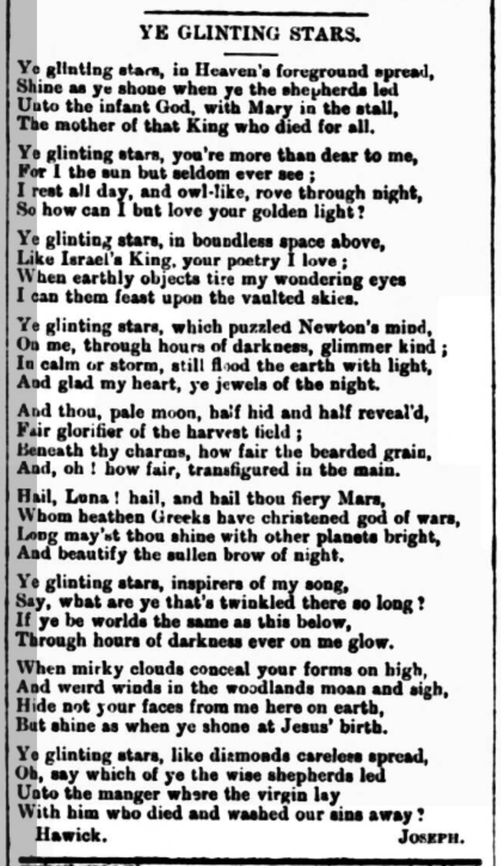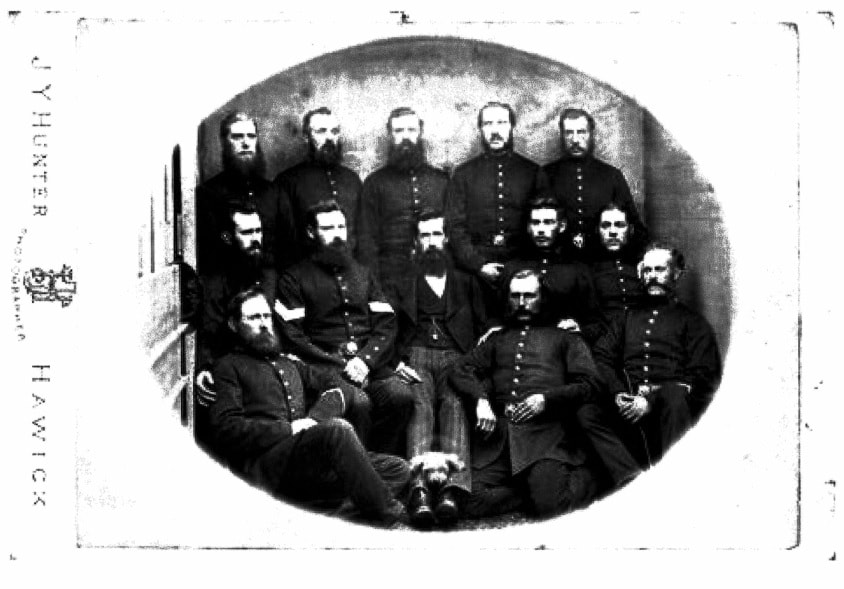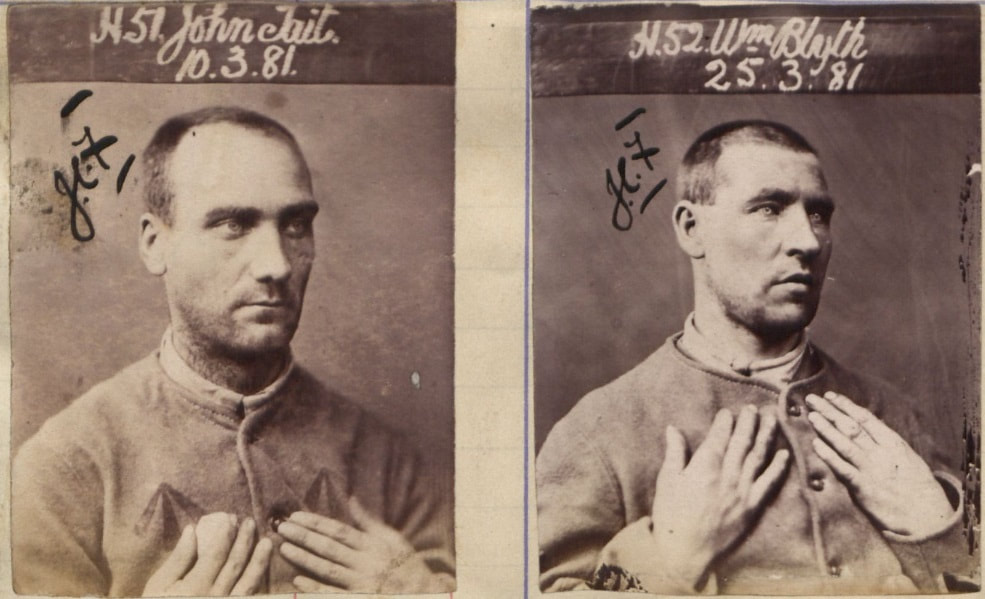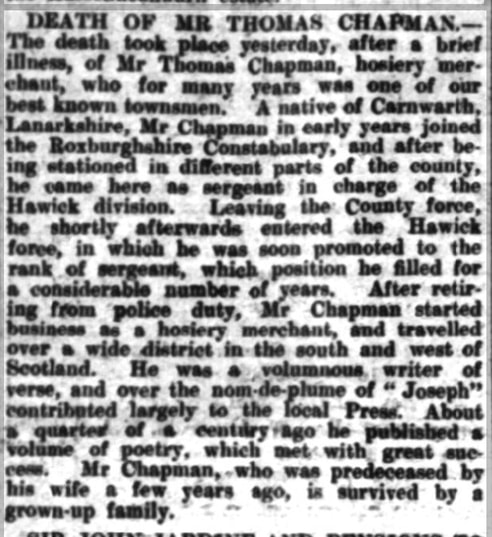|
On a dark November night in 1873, two policemen made their way along the Yetholm to Morebattle road in search of poachers. There had been reports of activity the previous night and the men were hopeful of making an arrest. Police Constable Thomas Chapman was in charge of the Yetholm district and he was supported by PC Elliot Jackson who would later rise to Inspector of Police, Head of the Kelso Division and was the recipient of the King’s Police Medal. About 300 yards west of Primside old tollhouse, they encountered a cart driven by two notorious poachers – William Blyth and John Tait. When challenged, they refused to stop and the policemen were beaten with cudgels. Despite Tait and Blyth making desperate efforts to drive off, the policemen cut the reins and hung onto the bridle and managed to lead the horse into a bank which brought it to a stop. In the ensuing struggle, both policemen were injured and the poachers made off. In the Swan Inn, John Graham was having a quiet drink when he saw Blyth and Tait enter – Blyth said: “The police have had a good thrashing tonight”. About 11 o’clock that night, Chapman caught up with Blyth and Tait accompanied by another man emerging from the Swan Inn and they boasted that they “…have the stuff sold, and are drinking the money”. Blyth and Tait were later charged and sentenced to six months in gaol. Thomas Chapman was a brave and dutiful policeman who served Yetholm and its surrounds well before transferring to Hawick where he was promoted sergeant but I wonder how many of the villagers knew that he had aspirations as a poet? He regularly sent contributions to local newspapers which were published under the nom de plume ‘Joseph’. His subject matter was largely drawn from Bowmontside along with local friends and acquaintances but he would occasionally indulge in pure flights of fancy. In 1883, he compiled a book of two hundred poems published by J & JH Rutherfurd of Kelso called: “Contentment and other poems”. This gathered ‘mixed’ reviews with the Border Advertiser waspishly remarking that: “Were the literary efforts of this work as good as the part played by the publisher, they would have much to recommend them”. Ouch! It was suggested that a good editor might have been useful but conceded that: “Mr Chapman evidently has the poetic genius”. The Hawick Express suggested that: “There is thought and freshness, as well as considerable facility of expression, in Mr JT Chapman’s unpretending little volume of poems. The inter-dependence of pain and pleasure is brought out in the verses”. Chapman was born around 1843 (his birth seemingly unregistered) in Carnwath, Lanarkshire. His father was a farm servant and, by 1861, Thomas was a servant in the house of the local Justice of the Peace. By the time of the 1871 census, he had married, had three children, joined the police and was based at Sprouston. In a court statement in July 1871, he states that he had been stationed in Yetholm about two months so we can be confident about when his association with the town began. He stayed in Yetholm for several years but, by the time of the 1881 census, he had moved with his family to Hawick. After retirement, he became a hosiery merchant until his death in November 1914. The Hawick News & Border Chronicle carried a short obituary which states that: “Mr Chapman was best known for the persistency with which, during the greater part of his life, he ‘courted the muse’. Above the nom de plume of ‘Joseph’ his effusions appeared in a number of Border newspapers”. His poetry reflects the fondness he had for friends and countryside around Yetholm. In That Day I left the Bowmontside he wistfully looks back and compares the Bowmont with the Hawick Slitrig – That day I left the Bowmontside My heart beat sad within me; Each ferny glen and rugged peak I grieved to leave behind me. The Slitrig ne’er can glad mine eye; No, it can never charm me; Oh, for the Bowmont hills sae high, The thoughts o’ them still warm me. Other paeans to the area include: Bowmontside, Green Vale of Bowmont, The Cantie Folk o’ Bowmontside and The Bowmont Hills. Fellow friends in the police force are commemorated including the Crimean veteran Sergeant David Readdie of Jedburgh. Readdie, like Chapman, pitted himself against the poachers and, on one occasion on the Teviot at Sunlaws Mill, had to be carried to the doctors at Kelso with a cleik embedded past the barb in his neck! Another colleague was Sergeant Robert Ainslie of Jedburgh who died in 1881. Thou servant of great Nature’s law – Alas! thou’st ta’en my friend awa’; From sorrow’s fount our tears ye draw, For a’ folk likit Robert. Such men as him earth ill can spare, Without him Jethart looks quite bare; The echoes o’ the court-room stair Lang for the feet of Robert. Up Castlegate the rogues he led – Of him ill-doers had a dread; But it again he’ll never tread, For in the dust lies Robert. In 1878, a farm labourer named Jacob Tait died in Kirk Yethom aged 76 and we must presume that he was a fine fiddler – Oh, take it not frae aff the wall, That fiddle nor the bow; Hush’d be it now, for cold the hand Which made the music flow. No more, my lads, will we e’er dance To the melodious strains Which often made our hearts rejoice, And blood warm in our veins. Though others wake the giddy reel Wi’ notes that please the ear, They cannot make us leap like him Whom we all loved so dear. Whene’er his fingers touched the strings, Our bosoms filled with glee; Oh! such a chield for mirth as him Again we’ll never see. William Martin of Dean Mill had been a rabbit catcher and assistant keeper at Greenhill but died tragically young at the age of 43. Chapman, in the course of his duties, would have been on friendly terms with all the gamekeepers but William’s death seems to have struck a special chord and Chapman eulogised him in a long poem from which I’ll just quote the first two verses - A mellow harp has been unstrung, And silent, too, the tuneful tongue Of him who, like a seraph, sung, And charmed us a’ by Bowmont. By that fair stream he often trod, But o’er him now’s the grassy sod, And never more with gun and rod Shall we see him by Bowmont. Postscript There is little doubt that Chapman, in his encounter with Tait and Blyth, was lucky to survive. Blyth had already been imprisoned for assault and both men were obviously determined to escape come what may - such an attitude would have tragic consequences only seven years later. In November of that year, John Taylor, a shepherd at Hethpool farm, discovered John Tait and William Blyth catching rabbits. He informed Thomas Henry Scott, the police officer at Kirknewton, and Scott met the gamekeeper Thomas Allen who happened to be on the road. The two men confronted Tait and Blyth who said that they would die before they gave the rabbits up. In the confrontation, both men hit Scott on the head with stones – Tait “as much as he could hold” and Scott fell into a burn. Not content with this, Tait continued to beat the prostrate policeman with a club and then went for the gamekeeper too. Fortunately, Allen had a gun and threatened to “put a hole through” Tait who then ran off. Scott was badly hurt but alive and Allen took him to Paston and sought medical assistance. Tragically, Scott died some days later of tetanus. Allen, the keeper, said that Tait had only just been released from a twelve month sentence for assaulting him previously. Blyth was taken into custody on the 17th November by PC Robert Thomson, stationed at Yetholm, when he said: “I wish I’d killed him; as weel hang soon as syne”. Tait and Blyth were charged with murder but were found guilty of manslaughter. Tait was given a life sentence and Blyth got ten years. In 1890, Blyth was out of prison on a ‘ticket of leave’ but left Yetholm without informing the police so was returned to prison for a month. Thank you to Ian Abernethy for contibuting this blog post.
Chapman's Contentment can be read for free on Google books - click HERE. No photograph of Chapman appears to have survived, The photograph shown in the body of the text is from the Scottish Police Medals website - click HERE. The gentleman in the centre is probably John MacDonald, Chief Constable of Hawick, 1878-1902. Chapman is listed as a policeman in Hawick in the 1881 and 1891 censuses, so he may well be one of the distinguished looking policemen gathered around their commanding officer. He was 46 in 1891, so if the photograph was taken around that date this may help to pin him down ... could he be the splendidly bearded sergeant sitting beside the Chief Constable??? As the newspaper obituary shown above indicates, Thomas Chapman was, after he moved to Hawick from Yetholm, a police sergeant 'for a considerable number of years'. The name of the dog is unrecorded! The poem from the head of the blog - Ye Glinting Stars - is from the Jedburgh Gazette, 23rd February 1884. It is not included in Contentment, which was published a year earler. It seemed fitting, given its references to the Nativity, to include it in our blog for December 2022, almost 140 years after it was written.
0 Comments
|
Archives
July 2024
|




 RSS Feed
RSS Feed
